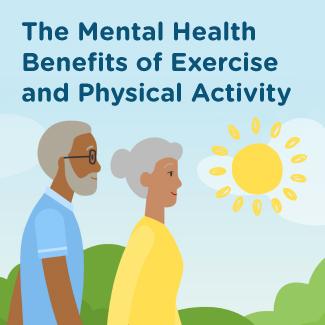Exercise is not only beneficial for physical health but also for mental health.
It has been shown to improve mood, reduce stress, anxiety, and depression, and enhance overall well-being. In this article, we will discuss the mental health benefits of exercise and how it can improve the quality of life.
Exercise can also help to regulate the body’s stress response system, leading to better management of stress and anxiety.

Reduces Stress and Anxiety: Exercise can help to reduce stress and anxiety levels by releasing endorphins, which are natural chemicals in the body that can improve mood and reduce feelings of stress and anxiety.
Exercise improves mood by increasing the production of neurotransmitters like dopamine and serotonin, known to enhance mood and alleviate depression symptoms.
Exercise can also provide a sense of accomplishment and self-esteem, leading to a more positive outlook on life.
It can enhance brain function by increasing blood flow to the brain, improving oxygen and nutrient delivery, and promoting the growth of new brain cells. Exercise boosts brain function and enhances cognitive abilities and memory.
This can lead to improved cognitive function, memory, and overall brain health.
Lessens Depression Symptoms: Exercise effectively treats depression, matching medication or therapy’s effectiveness in studies.
Exercise can help to increase self-esteem, reduce social isolation, and provide a sense of purpose, all of which can improve symptoms of depression.
Improves Sleep: Exercise can improve the quality of sleep, leading to better overall health and well-being. Regular exercise can help to regulate the body’s sleep-wake cycle, leading to better sleep quality and duration.
It can also help to reduce symptoms of sleep disorders, such as insomnia.
Boosts Energy: Exercise increases energy by enhancing blood flow, oxygen delivery, muscle function, and endurance.
Exercise can also help to reduce fatigue and improve overall physical performance, leading to improved energy levels and overall well-being.
Cuts Cognitive Decline Risk: Exercise reduces the risk of cognitive decline, including dementia and Alzheimer’s.
Regular exercise can help to promote brain health and function, leading to improved cognitive function and overall brain health.
Improves Self-Esteem and Body Image: Exercise can improve self-esteem and body image by promoting a sense of accomplishment and self-confidence.
Regular exercise can also lead to improvements in physical appearance and body composition, leading to improved self-image and overall well-being.
Enhances Social Support: Exercise fosters social interaction, improving connections and overall well-being.
Individuals can engage in exercise on their own or as part of a group, providing opportunities for social interaction and support.
Enhances Overall Well-being: Exercise can enhance overall well-being by improving physical health, mental health, and social connections.
Regular exercise can lead to improved quality of life, reduced risk of chronic diseases, and overall improved well-being.
In conclusion, exercise has numerous mental health benefits that can improve the quality of life.
Regular exercise improves mood, reduces stress, enhances brain function, reduces depression symptoms, improves sleep, increases energy, lowers cognitive decline risk, boosts self-esteem, enhances social connections, and improves overall well-being.
Incorporating exercise into daily life can lead to improved mental and physical health and an overall better quality of life. 온라인카지노사이트
nxediyunlandayi.C1DLiYU449Sv